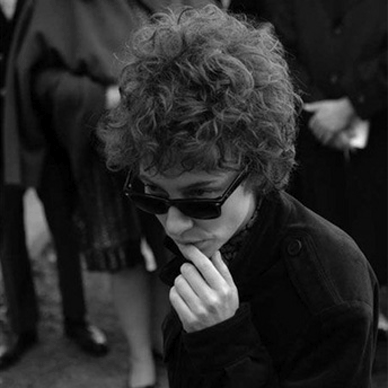only magazine
↵ home
I'm Not There

By Adam Thomas
Thursday November 29, 2007
LIKE DYLAN IN THE MOVIES
Call him enigmatic, mysterious, elusive or private, but the real Bob Dylan is still a bit of an asshole. There’s no denying his influence or creative talent, but as the man will tell you himself, and like the film I’m Not There makes clear, don’t look to him for answers. Nor should you look to director Todd Haynes. I’m Not There is a bit of an enigma; like Dylan himself, a dysfunctional and contradictory expression of a generation that has lost its purpose.
Not a bio-pic exactly, I’m Not There traverses time and type to portray Dylan as multiple people — some recognizable, some iconic and others thoroughly imagined — exploring the concept of “Dylan” more than exposing the actual man. And while boomers everywhere will fall for the nostalgic and non-narrative revision of one of their generation’s most influential figures, the reality is that this movie isn’t about the great movements of the time or the political battles waged in the streets. It isn’t a fond trip through some hippy scrapbook recalling the freedom and possibilities of a time since traded in for personal comfort and social neglect. It is a film about personal failure, inescapable pressure and misguided success, all told through an inter-connective web of vignettes about an artist who never wanted to be taken at his word.
Instinctively the film is an exercise in deconstruction, or possibly even a devious attempt at re-assemblage. With actors like Christian Bale, Heath Ledger, Ben Winshaw, Marcus Carl Franklin, Richard Gere and Cate Blanchett all embodying the role of the man who constantly reshaped his own image and fought off all attempts to be defined. The film presents instances of a composite character – glimpses of a real man whose defiance made him frustratingly inaccessible and yet profoundly effecting. It’s the idea that the contradictory figure embodies the reality of everyone, and that singularity only exists in memory. Spanning the essential and formative years of Dylan’s ongoing career, from country-folk troubadour to freewheeling electric balladeer, Haynes constructs segments of his life and career that shift back and forth between an imagined pre-teen train-riding southern-songwriter to a fictional actor in the throws of a divorce to the iconic Dylan from Don’t Look Back. The effect of this non-linear character study is a strange kind of emptiness — a wobbly world of references where the only warmth, depth and truth comes from the connection you might have to the music yourself. We are not offered definitive or reliable representations, but instead the personas and abstract configurations of a flawed human being. They are antagonistic, mean spirited, un-cooperative and abandoning. Like the ’60s generation come yuppie, the multiple Dylans leave their roots behind in a quest for self determination and perpetual self importance.
But if, as this film suggests, it’s impossible to know just one man — even someone as well documented as the actual Dylan — then how is it even conceivable to understand an entire generation? You can’t, and maybe that’s the point. And while the purpose of I’m Not There is to explore the notion of personal history, image construction and pressures of being a pop culture icon, the reality of this combination between fact and fiction is a subtle yet sad acknowledgment of human failure and cumulative cultural delusion. There is a quiet, biting irony to it all, buried among the icons, images and music. A saddening and honest recognition of failure that binds all the boomers who wanted change, fought for it, but then retired back into themselves. As the multiple players portray the multiple facets of a singular man, the film constantly returns to the notion that there is no one. There are no saviours, no saints and no personal salvation. There are only people caught in time, forced to embrace or shrug off the pressures placed on them, and they, like the rest of us, are flawed and full of fault. There is no singularity, just a murky treatment of collective memory, constructed out of time for a generation sliding further and further out of touch.
